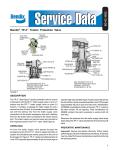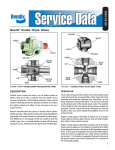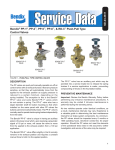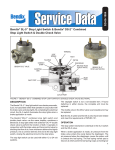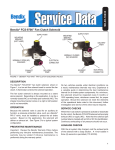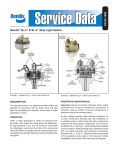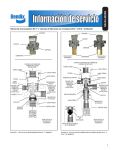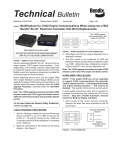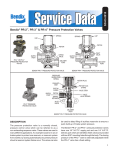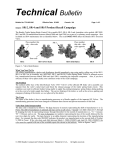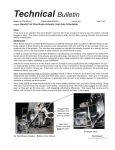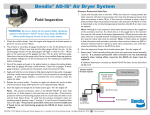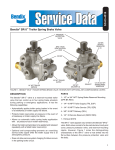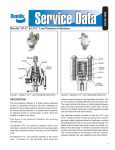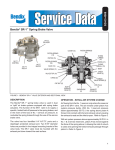Download BENDIX SD-03-3652 User's Manual
Transcript
SD-03-3652 Bendix® TP-3® Tractor Protection Valve TRACTOR EMERGENCY PORT TRAILER EMERGENCY PORT O-RING(13) PLUNGER(11) INLET VALVE(4) TRAILER SERVICE PORT TRACTOR SERVICE PORT VALVE RETAINER(10) RETAINING RING(2) O-RING(12) VALVE SPRING(6) DIAPHRAGM SEAT(9) SEAT DIAPHRAGM(5) WASHER(8) EXTERIOR VIEW O-RING(7) RETAINING RING(1) CAP SCREW(3) CROSS SECTION FIGURE 1 - BENDIX® TP-3® TRACTOR PROTECTION VALVE DESCRIPTION PREVENTIVE MAINTENANCE The Bendix® TP-3® Tractor Protection Valve is used in combination with the Bendix® PP-3™ Trailer Supply Valve on pre-121 tractors, and the Bendix® PP-7™ Trailer Supply Valve, or the Bendix® MV-3® Valve, on post-121 tractors. It contains a passage for trailer supply air and a service line shut off valve. It is normally mounted behind the cab, with the delivery line from the trailer supply valve connected into the tractor emergency port and a delivery line from the brake valve connected to the tractor service port. The trailer supply and service hoses are mounted in their respective ports in the TP-3 valve. See Figure 2. Important: Review the Bendix Warranty Policy before performing any intrusive maintenance procedures. A warranty may be voided if intrusive maintenance is performed during the warranty period. OPERATION Air from the trailer supply valve passes through the emergency ports of the TP-3 valve to supply the trailer air system and simultaneously exerts pressure on the end of the plunger(11). The TP-3 valve requires approximately 45 psi to open the inlet valve. Whenever the pressure from the trailer supply valve drops below 45 psi, the TP-3 valve will close the service line shut-off valve. No two vehicles operate under identical conditions; as a result, maintenance intervals may vary. Experience is a valuable guide in determining the best maintenance interval for air brake system components. At a minimum, the Bendix TP-3 valve should be inspected every 6 months or 1500 operating hours, whichever comes first, for proper operation. Should the TP-3 valve not meet the elements of the operational tests noted in this document, further investigation and service of the valve may be required. 1 TRAILER EMERGENCY LINE BENDIX TP-3 TRACTOR PROTECTION VALVE ® BENDIX® MV-3® CONTROL VALVE ® TRAILER SERVICE LINE DOUBLE CHECK VALVE BRAKE VALVE AIR DRYER FRONT RESERVOIR REAR RESERVOIR COMPRESSOR FIGURE 2 - SYSTEM SCHEMATIC OPERATING AND LEAKAGE CHECKS REMOVING 1. Block and/or hold the vehicle by a means other than the air brakes during these tests. Place the trailer supply valve in the emergency position and disconnect the trailer supply and service couplings. Remove the trailer hose assemblies from the TP-3 valve. Disconnect tractor service and supply lines and remove the TP-3 valve. 2. With the tractor reservoirs charged to at least 100 psi, make and hold a full service brake application. Leakage at either tractor hose coupling should not exceed a 1 inch bubble in five seconds (100 SCCM). INSTALLING 3. Connect the trailer supply, or emergency line, hose coupling and place the trailer supply valve in the “run” position. Leakage at the “service” coupling should not exceed a 1 inch bubble in five seconds (100 SCCM). 4. Connect the service coupling and make and hold a full service brake application: Leakage at the diaphragm end of the Bendix ® TP-3 ® Valve shall not exceed a 1 inch bubble in three seconds (175 SCCM). NOTE: If the TP-3 Valve does not function as described, or if leakage is excessive, it is recommended that it be replaced or repaired using genuine Bendix service replacement parts. 2 When installing the TP-3 valve, refer to Figure 2, and the following explanation, for proper connections. 1. The delivery line from the Bendix® MV-3® Dash Control Valve is connected to the tractor emergency port of the TP-3 valve. 2. The delivery line from the brake valve (or double check valve) is connected to the tractor service port of the TP-3 valve. 3. Trailer hose assemblies are installed in the trailer emergency and trailer service ports of the TP-3 valve. DISASSEMBLY (See Figure 1.) 1. Remove the diaphragm seat retainer ring (1) while holding the diaphragm seat (9) in the body. 2. While still holding the diaphragm seat in the body, remove the date code ring. 3. Allow the seat to rise until the valve spring force is no longer present. NOTE: When using pipe thread sealant during assembly and installation, take particular care to prevent the sealant from entering the valve itself. Apply the sealant beginning with the second thread back from the end. 1. Install the inlet valve (4) on the plunger (11). 2. Position and force the valve retainer (10) down over the inlet valve. 4. Remove the diaphragm seat assembly (9), valve spring (6), and plunger assembly (11). 3. Install the retainer ring (2) beneath the inlet valve retainer. 5. Remove the diaphragm seat o-ring (7), cap screw (3), diaphragm washer (8) and diaphragm (5). 4. Install both plunger o-rings (12) and (13) in their proper grooves. 6. Remove the valve retainer ring (2), valve retainer (10), inlet valve (4), and o-rings (12) and (13) from the plunger. 5. Place the plunger and valve assembly in the valve body. CLEANING AND INSPECTION 6. Install the cap head screw (3), diaphragm washer (8) with the cup side up, and diaphragm (5) into the diaphragm seat (9). 1. Clean all metal parts in mineral spirits and dry them completely. 7. Place the inlet valve spring (6) into the plunger. 2. Inspect all parts for excessive wear or deterioration. Inspect valve seats for nicks or burrs. Check the valve spring for cracks or corrosion. 9. Position the diaphragm seat assembly over the spring and plunger assembly and force it into the body. 3. Inspect the bores of the valve housing for deep scuffing or gouges. Replace all parts that were discarded, and any parts not found to be serviceable during inspection, using only genuine Bendix® replacement parts. ASSEMBLY 8. Install the diaphragm seat o-ring (7) in the body. 10. Replace the date code washer and install the retaining ring (1) making sure the retaining ring snaps fully into the groove. TESTING SERVICED BENDIX TP-3 VALVES Perform the operating and leakage checks as outlined in previous section. Before assembling the Bendix® TP-3® Tractor Protection Valve, lubricate all o-rings, o-ring grooves, body bores and rubbing surfaces with Bendix silicone lubricant (Piece No. 291126) or equivalent. 3 BW1572 © 2012 Bendix Commercial Vehicle Systems LLC, a member of the Knorr-Bremse Group • 9/2012 • All rights reserved.. 4




